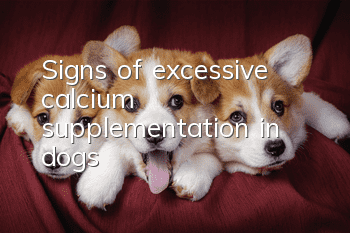Signs of excessive calcium supplementation in dogs

Excessive calcium supplementation in a short period of time in dogs will burden the intestinal tract, leading to constipation, anorexia, indigestion, etc. If calcium supplementation is excessive for a long time, it will also cause hypercalciuria, increase the chance of stone formation in the urinary system, and may also calcify the dog's bones, making the bones brittle and prone to fractures. When the blood calcium concentration is too high, it will also affect the dog's bones. to visceral function. Therefore, when raising dogs, do not blindly feed nutrients, but make reasonable adjustments based on the dog’s daily diet.
1. Symptoms of excessive calcium supplementation in dogs in the short term
After excessive calcium supplementation in dogs, most of the excess calcium will be excreted through feces, which mainly increases the burden on the dog’s gastrointestinal tract. Individual dogs may experience minor symptoms such as constipation, anorexia, and indigestion, but generally more serious reactions will not occur.
2. Symptoms of long-term excessive calcium supplementation in dogs
1. Causes long-term hypercalciuria and increases the chance of forming stones in the urinary system.
2. It causes premature calcification of cartilage and premature closure of the anterior fontanel, resulting in microcephaly, which restricts the brain development of dogs.
3. Premature calcification of bones, premature epiphyseal closure, affecting the development of long bones, and limiting terminal height.
4. If there is too much calcium in the bones, the bones will become brittle and prone to fractures.
5. Affect the dog’s appetite, thereby affecting the intestinal absorption of other nutrients.
6. Excessive calcium in the intestine will inhibit the absorption of iron, zinc and other divalent ions, causing secondary zinc and iron deficiency, and leading to reduced immunity, anorexia, and slow growth in dogs. , anemia, fatigue and other corresponding symptoms.
7. If the blood calcium concentration is too high, calcium will be deposited in the internal organs or tissues. If it is deposited around the cornea, it will affect vision. If it is deposited on the heart valve, it will affect the heart function. If it is deposited on the blood vessel wall, it will be. Aggravate vascular sclerosis, etc.
- At what age is it appropriate for Teddy to start training?
- Why are Shiba Inu so cute?
- When is the best season to neuter a male dog?
- How much does a Stabehhound cost and is it easy to raise_Pictures|Training
- How to avoid food poisoning in Yorkies
- How to treat tonsillitis in English Foxhound
- How to Treat Bronchitis in Dogs_Symptoms
- Can adult dogs get parvovirus?
- What's wrong with the dog dripping urine?
- How to train a dog to maintain a certain posture



